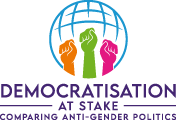About
Following the 1990s, the states of Eastern Europe (EE) and their close neighbours in the Near and Middle East (NME) underwent significant social changes and political developments, particularly with regard to democratisation. Political consensus on norms such as 'women's rights are human rights' and/or measures against sexual discrimination emerged as central components and symbols of democratisation and democratic societies.
Although these transformation processes had different and unequal impacts within and between EE and NME states, they shared some commonalities in their approach to transnational gender equality norms and policies.
These commonalities have been contested for around 15 years. Current conflicts in the EE and NME states have focused on so-called 'European values', particularly gender and sexual equality. However, these values are opposed by religious fundamentalism, homophobia and neo-traditionalist ideology. Not only are democratic values at stake, but gender and sexual identity equality norms and policies are too.
The network aims to conduct comparative research into anti-gender politics in Eastern Europe and neighbouring countries at its academic events, and to disseminate these findings. This is because the systematic investigation of the link between the rise of anti-gender and anti-feminist mobilisations and the decline of democratic norms and structures has yet to be carried out.
Four working groups will be established, comprising colleagues from EE and NME countries, as well as early-career researchers, innovators and NGOs.

